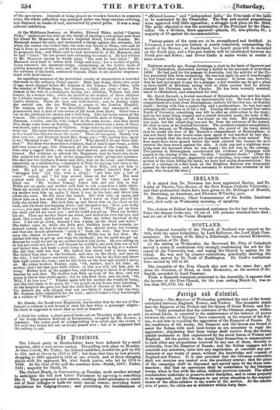The Liberal party in Hertfordshire have been defeated by a
small majority, after a very severe contest. The polling took place on Monday. At nine o'clock, Mr. Puller, the Liberal candidate, headed the poll by 294 to 234, and at eleven by 1015 to 897; but from that time he lost ground, dropping to 1664 opposed to 1640 at one o'clock, and at three changing places with his opponent, Mr. Abel Smith junior, who led by 1970 to 1,966. At the close of the poll the numbers were—Smith, 2205; Puller, 2151; majority for Smith, 54.
The Oxford Heads, in Convocation, on Tuesday, made another attempt to antidote the bill now before Parliament by agreeing to something Lie it. They proposed a new statute, enabling under-graduates to reside Out of their colleges or halls for some special reason; providing better regulona filar lodging-houses ; and permitting the establishment of "affiliated houses " and "independent halls," the Principals of the halls to be nominated by the Chancellor. The first and second propositions were approved with little opposition; a struggle took place on the third, The point objected to was the nomination of the Principal by the Chan- cellor. On a division, there appeared—placets, 25, non-placeta, 64; a majority of 39 against the recommendation.
Various points of the coast are to be strengthened and fortified. At Liverpool, a new ten-gun battery is nearly completed, commanding the mouth of the literacy; at Sunderland, two heavy guns will be mounted on the South pier, and a five-gun battery will be established between the North pier and Roker; and Dover Castle is under works to render it more secure.
Eighteen months ago, George Jennings, a clerk in the bank of Sparrow and Co., at Chelmsford, absconded, leaving a deficit in his accounts of more than 10001. He had paid for his passage to Australia, but the activity of the Po- lice prevented him from embarking. He was lost sight of, and it was thought he had found other means of leaving the country. It turns out, however, that he had not money to pay for a passage; a few months ago he got a place as farm-bailiff at Mitcham, acting with so little caution that he merely changed his Christian name to Charles. He has been recently arrested, taken to Chelmsford, and committed for trial.
Mr. David Barnett, a Jewish merchant of Birmingham, has met his death on the Birmingham railway in an unaccountable way. He took a first-class compartment of a train from Birmingham, entirely for his own use, on Sunday night ; having with him a carpet-bag and a portmanteau : he was last seen arranging the cushions as if for a bed. Passing through a tunnel four miles North of Coventry, something was felt to offer an obstruction to the train; and on the train being stopped and a search instantly made, the body of Mr. Barnett, with both legs cut off, was found on the rails. His portmanteau was near, but the carpet-bag was not far from the entrance of the tunnel. He died as soon as he reached Coventry. The accident remains unexplained. At the inquest, on Wednesday, Chapman, the guard of the train, stated that he closed the door of Mr. Barnett's compartment at Birmingham; it was not likely the door would come open again if not tonched by any one; he was certain that the door was not reopened before the train started. The door must have been opened before the train entered the tunnel, for as it entered the door struck against the side. A cloth cap and a nightcap were lying near the deceased when he was found ; his hat was in the carriage. Two porters at Birmingham corroborated the evidence of Chapman with regard to the closing of the door. Verdict, "Accidental death." [That the door of a railway-carriage, apparently safe at starting, may come open by the motion of the train lifting the latch, we have had ocular demonstration : the door of a carriage in a fast train on the Brighton Railway was frequently opened by the motion ; and it was necessary to attract the attention of the guard, who locked the door.]


























 Previous page
Previous page